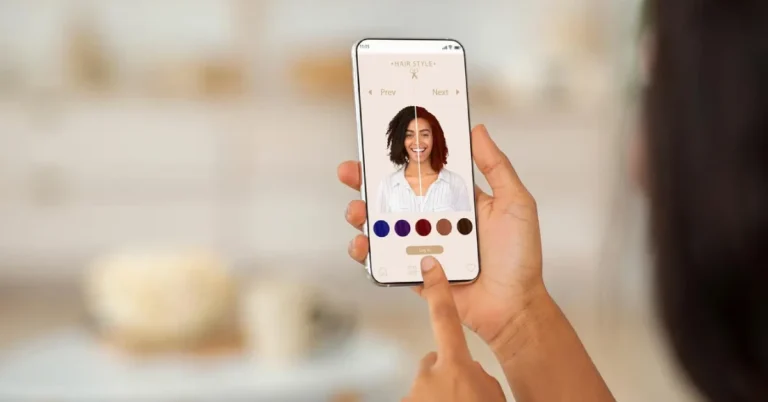What happens when the mirror lies to you—sweetly, subtly, and with algorithmic precision?
In the age of TikTok, Instagram, and AI-driven apps like FaceApp, our faces are no longer just reflections but are transformed by beauty filters that alter face shape. They’re data points. They’re filtered projections of what we wish—or are pressured—to be. The rise of AI-powered beauty filters has transformed digital self-expression into a high-stakes ethical dilemma. Where do we draw the line between enhancement and deception? Between fun and harm in the world of AI filters?
This article explores the technological foundations and moral implications of AI-enhanced facial filters, investigating how they shape identity, reinforce biases, and influence our mental health and social relationships.
From Fun to Norm – The Rise of AI Beauty Filters
Modern beauty filters, like those found in Facetune, go far beyond bunny ears or retro grain. Powered by machine learning, facial recognition, and GANs (generative adversarial networks), today’s filters can reshape jawlines, smooth skin, lift brows, enlarge eyes, and even simulate makeup with alarming realism.
Unlike traditional photo editing, these changes happen in real-time, directly on video feeds, and with near-perfect subtlety—making it hard to tell what’s real and what’s algorithmically enhanced by advanced AI technology.
According to a 2024 Pew Research study, over 70% of Gen Z users report using facial enhancement filters weekly. Apps like TikTok and Snapchat offer default “beauty modes” on camera. On platforms like Zoom and Teams, corporate professionals smooth their skin or whiten teeth with a single tap.
Filters are no longer optional—they’re often expected.
Beauty by Algorithm – What’s the Problem?
AI beauty filters are often trained on datasets that reflect Eurocentric, youth-oriented, and gendered norms of attractiveness. This means that users are algorithmically nudged toward lighter skin, smaller noses, larger eyes, and thinner faces—regardless of their ethnicity or features, reinforcing unrealistic beauty standards.
This isn’t just aesthetic; it’s ideological. As Dr. Safiya Noble (author of Algorithms of Oppression) argues, AI systems can “amplify the racial and gender biases already embedded in society,” especially when it comes to beauty standards.
Constant exposure to filtered versions of oneself leads to a growing phenomenon known as filter dysmorphia—a form of body image distortion where individuals become dissatisfied with their natural appearance.
In 2023, the British Psychological Society found that 1 in 3 teen girls had considered cosmetic procedures to match their AI filters.
At the heart of this shift is a growing dependence on augmented reality and artificial perfection—a point where many users no longer feel comfortable posting or even video calling without enhancements.
Consent and Deception in a Filtered World
One of the core ethical issues with AI beauty filters is informed consent, particularly regarding the use of facial features in advertising. In many cases, viewers are unaware that the face they’re seeing has been altered. This has implications for dating apps, job interviews, and influencer marketing, especially with the rise of TikTok’s bold glamour.
Some countries are now regulating this. For instance, Norway’s 2021 “Influencer Law” requires digital creators to disclose when images have been retouched or filtered for promotional use.
But elsewhere, digital deception with face filters remains largely unchecked.
At the intersection of ethics and artificial intelligence, many users are turning to tools like chatbots and virtual assistants for beauty advice, self-image tips, or even psychological support. But these systems—trained on the same datasets that drive filters—can reflect the same biases inherent in beauty standards.
When you ask AI what makes a face beautiful, its answer is rarely neutral. It mirrors societal norms encoded into its training. In other words, the mirror now talks back—but it might not tell the truth.
Cultural Impact and the Flattening of Diversity
A 2022 meta-analysis in AI & Society found that most filters across platforms applied remarkably similar adjustments regardless of the user’s background—resulting in a narrowing of expressive individuality.
This contributes to what some critics call the “Instagram face”—a universal look combining Western, East Asian, and Kardashian-esque traits that homogenizes beauty into a bland, algorithm-approved ideal.
This phenomenon not only erases cultural identity but also influences real-world cosmetic surgery trends driven by beauty standards. Surgeons report that patients increasingly bring in filtered selfies, enhanced by advanced AI technology, as reference material.
Can AI Be Designed More Ethically?
Some developers are pushing back. Instagram now labels filtered stories with photo filters that create unrealistic beauty standards. Beauty brands like Fenty have refused to use digital face-altering AI technology in ads, promoting authenticity over unrealistic beauty standards. Meanwhile, open-source projects are building inclusive AI models that celebrate a broader spectrum of beauty.
Tech companies must make responsible defaults—avoiding automatic “beautification” modes and providing transparency about enhancements.
As awareness grows about the impact of ai technology, countries are beginning to act. The EU AI Act includes clauses about biometric manipulation and emotional recognition, which could apply to facial filtering. However, laws can’t move as fast as trends, making education crucial.
Teaching digital literacy in schools, promoting filter-free campaigns, and supporting positive body image initiatives are equally important.
Conclusion
AI beauty filters are not inherently evil. They can be tools of fun, creativity, and confidence. But when their use of AI skin filters becomes ubiquitous, unconscious, and opaque, they risk damaging how we relate to ourselves and to others.
Ethical beauty tech must balance enhancement with honesty, beauty standards with inclusion, and expression with the use of AI.
As digital citizens, we must ask hard questions—of our tech, of our culture, and of ourselves. And perhaps, the next time we reach for that subtle eye-enhancer or skin smoother, we should pause and ask: Whose face is this really?

